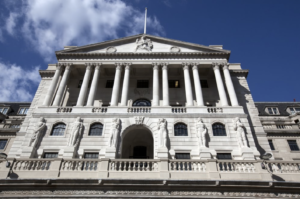The Post-Pandemic Challenge for the Bank of England: Independence?
Posted by Colin Lambert. Last updated: March 10, 2021
Does the Coronavirus pandemic present a threat to the effective independence of the Bank of England? Stuart Cole, chief macro strategist at Equiti Capital, envisages a scenario where it could…
After a near-enough year of relative calm, the rise in bond yields seen so far in 2021 can probably be described as unexpected. Although yields remain below pre-pandemic levels, the recent moves higher have come despite central banks repeating the message that they will be patient before withdrawing the significant support currently being provided.
This picture is certainly true in the UK, where, as domestic yields have risen, the Bank of England has been reminding the market that further quantitative easing remains available and negative interest rates sit in the policy toolbox. Opposing the markets, however, rarely turns out well for central banks, so why is the BoE doing so now?
The BoE has justified its position on the grounds that growth remains weak, unemployment is high and borrowing costs need to be kept low to bring both measures back to pre-pandemic levels. Despite this, however, UK yields have been edging upwards this year, moves that have taken place against the backdrop of an improving growth outlook as progress with COVID-19 vaccinations has seen the lockdown narrative switch to one of how soon restrictions can be removed. This improving outlook has been accompanied by rising pricing pressures, witness CPI climbing more than expected in January and the BoE expecting it to increase towards its 2% target this spring. Typically, this would be the signal for a tighter policy stance.
With the BoE standing pat, the rise in yields could be the market pre-empting an expected policy response, but it might also be an early warning that it sees the BoE slipping ‘behind the curve’ policy-wise, keeping policy too loose when some pre-emptive tightening might be prudent. Ordinarily the BoE would be sensitive to this credibility threat and signal that it stands prepared to tighten if necessary, so why is it not doing so now? Our suggestion is the need to prevent yields from rising is dictating policy, the BoE is unofficially focusing on keeping borrowing costs low.
The recent UK Budget contained few surprises, but what was unexpected was the further support measures announced for FY 2021/22, to the order of circa £70 billion and mainly financed via increased borrowing. This unexpected increase in Gilt supply surprised the market and triggered a rise in yields: the 10-yr yield rose to levels not seen since early 2020 while 30-yr yields rose by around 10bps. Given the UK Government’s need to keep borrowing costs low, pressure is almost certain to build on the BoE to provide some response to this increase in yields.
It is here, we suggest, that the issue lies for the BoE. With the UK Government still spending heavily, it is reliant on monetary policy to keep a lid on borrowing costs, ensuring debt servicing obligations do not spiral out of control – and for this, it looks to the BoE. Despite being operationally independent, the BoE simply cannot suggest current monetary settings should be tightened for risk of seeing yields rise even further, threatening the Government’s economic programme.
The ultra-loose monetary policy must remain, but as growth prospects and inflationary pressures rise, and the BoE does nothing, so it risks losing not only its credibility as the UK’s monetary guardian but also its effective independence in the eyes of the market. It is already only a small jump to conclude the BoE is yielding to pressure to support the Government’s fiscal strategy at the expense of monetary policy.
The Budget showed that the coronavirus pandemic has changed how the Government sees the UK economy going forward. Higher taxes and spending have replaced the ‘Singapore-style’ low tax, high growth model. How the BoE sets policy going forward may similarly determine if its status, too, has been changed by the pandemic: specifically, if it retains its reputation as an independent central bank or whether it comes to be seen merely as an operational arm of the UK Treasury.
Stuart Cole is chief macro strategist at Equiti Capital and has over 25 years of experience in banking at FX working at institutions including the Bank of England, Bank of Scotland and Mizuho Bank.
This material is provided for informational purposes only and does not constitute financial advice, investment advice, trading advice or any other advice or recommendation of any sort offered or endorsed by Equiti Capital. This material is not, and is not intended to be, a “research report”, “investment research” or “independent research” as may be defined in applicable laws and regulations worldwide. Please see the full disclaimer here: https://www.equiticapital.co.uk/media/11057/disclaimer.pdf





